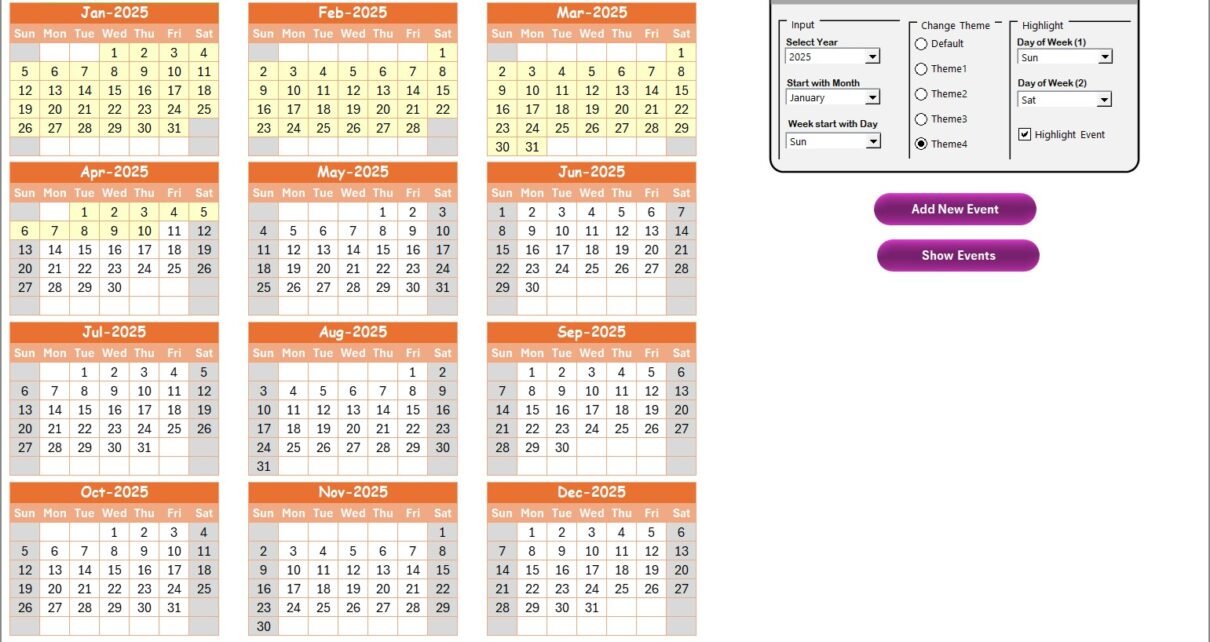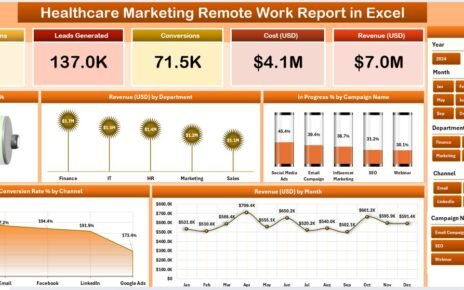In today’s digital healthcare landscape, maintaining quality control and cybersecurity has become more crucial than ever. With sensitive patient data stored in electronic systems, healthcare institutions face daily challenges in managing security events, monitoring quality parameters, and meeting compliance standards.
That’s where the Healthcare Quality Control Cybersecurity Calendar in Excel steps in — a ready-to-use, interactive tool designed to help healthcare organizations plan, monitor, and track all cybersecurity and quality-related events efficiently.
This article will guide you through its structure, features, advantages, best practices, and frequently asked questions — helping you understand how this Excel calendar can revolutionize your healthcare management workflow.
Click to buy Healthcare Quality Control Cybersecurity Calendar in Excel
What Is a Healthcare Quality Control Cybersecurity Calendar in Excel?
A Healthcare Quality Control Cybersecurity Calendar in Excel is a structured Excel-based template that allows hospitals, clinics, and medical facilities to manage both quality assurance and cybersecurity operations in one organized system.
It functions as an intelligent event tracker that displays activities across daily, monthly, and annual views. Whether you are scheduling quality audits, cybersecurity awareness sessions, or compliance checkups, this Excel calendar ensures nothing gets missed.
The best part? It’s automated, dynamic, and user-friendly — no coding or external software required. With built-in buttons, color themes, and smart filters, it helps you manage hundreds of healthcare events in an intuitive way.
Key Features of the Healthcare Quality Control Cybersecurity Calendar
The calendar is built on five well-structured Excel sheets, each serving a unique purpose. Let’s explore them in detail.
Home Sheet — The Control Center
The Home sheet acts as the main navigation hub.
It includes buttons for quick access to all the other sections:
- Annual View
- Monthly View
- Daily View
- Events Database
Each button takes you directly to its respective sheet with a single click. This makes navigation seamless and professional, especially for healthcare managers handling multiple compliance activities.
You can also customize the layout or include snapshots to create a branded and professional look for your organization.
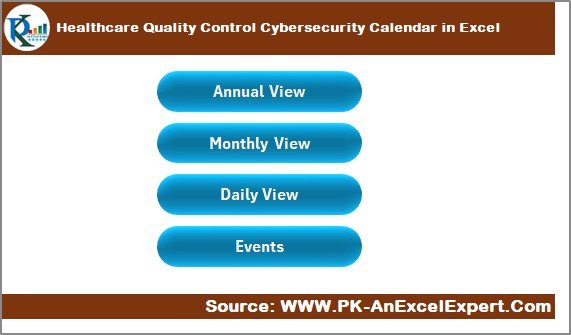
Click to buy Healthcare Quality Control Cybersecurity Calendar in Excel
Annual View Sheet — Yearly Overview at a Glance
The Annual View sheet displays all 12 months in one place.
This view is ideal for long-term planning of audits, staff training, maintenance checks, and cybersecurity reviews.
Control Panel Features:
The Annual View sheet includes a three-section control panel:
- Input Group:
Choose the Year, Start Month, and Week Start Day to automatically adjust the calendar layout. - Change Theme Group:
Pick from five different color themes to match your organization’s branding or preference. - Highlight Group:
Select which days of the week you want to highlight — for example, weekends or non-working days. You can even enable the “Highlight Events” checkbox to automatically mark all event days in yellow for quick recognition.
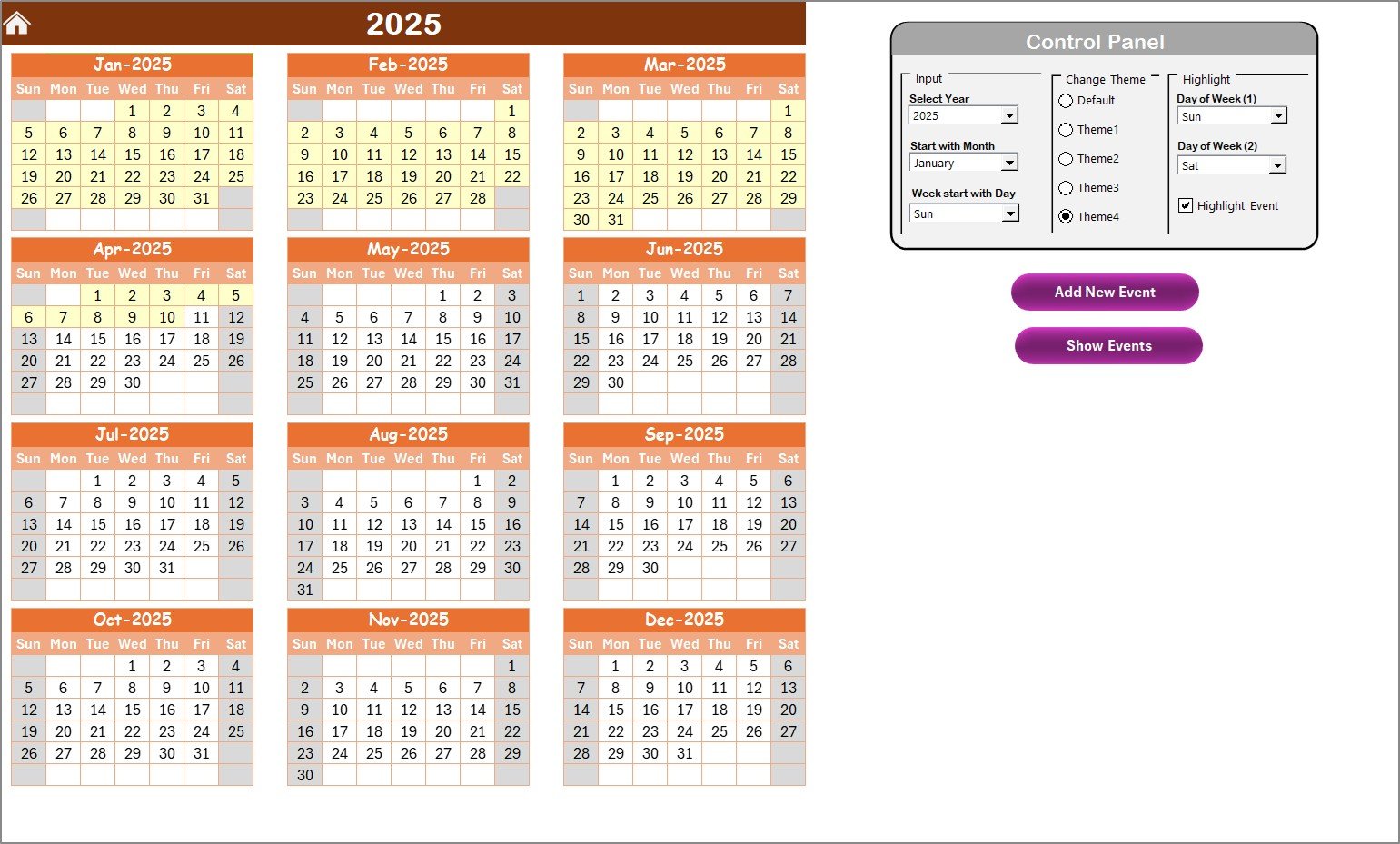
Click to buy Healthcare Quality Control Cybersecurity Calendar in Excel
Event Management Buttons:
- Add New Event:
Select a specific date and add an event using the built-in event form. - Show Event:
View all events scheduled for a chosen date without scrolling through lists.
This structured annual layout ensures every cybersecurity and quality-control event is visible at a glance — supporting better planning and resource allocation.
Monthly View Sheet — Manage Events Month by Month
The Monthly View sheet focuses on a single selected month and provides detailed control over all events within that month.
From the top of the sheet, you can select the Month and Year. The calendar will automatically update to display relevant days and scheduled activities.
If more than one event is scheduled on the same day, the cell displays “More than 1…” to indicate multiple activities.
Top Buttons:
- Add New Event:
Opens an event form to add new entries directly to the database. - Show Event:
Displays a pop-up list of events for the selected date, making event lookup effortless.
This monthly structure is perfect for operational-level planning, like cybersecurity workshops, patch update reminders, equipment maintenance, or patient safety audits.
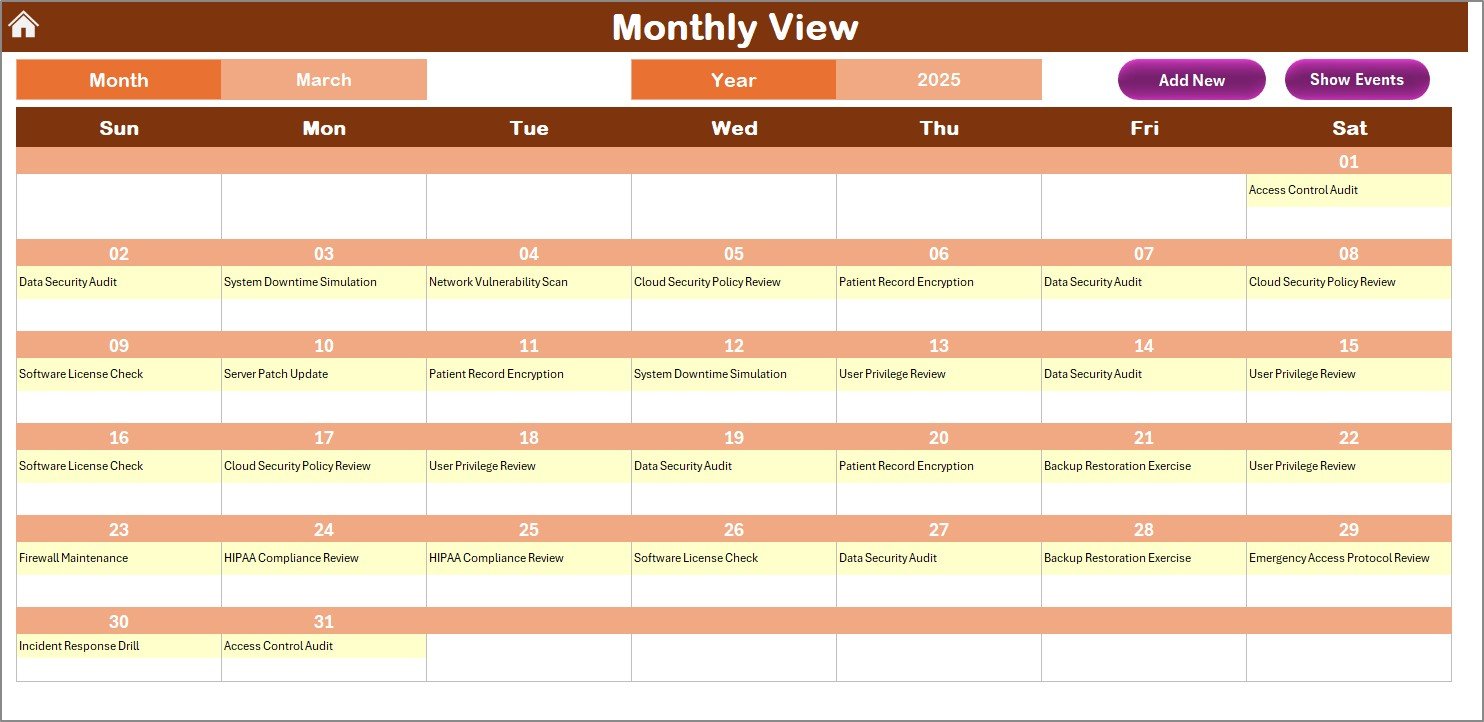
Click to buy Healthcare Quality Control Cybersecurity Calendar in Excel
Daily View Sheet — Track Detailed Activities
The Daily View sheet provides a detailed view of activities within a specific date range.
Simply select the Start Date and End Date using the date pickers. When you click the Refresh button, it automatically filters and displays all events scheduled within that period.
You can also use the Add New Event button to input new data directly from this screen.
This sheet is ideal for daily operations teams, IT administrators, and quality officers who need to monitor tasks like:
- System vulnerability scans
- Firewall configuration checks
- Data access reviews
- Quality assurance audits
- Incident response activities

Events Sheet — The Master Database
The Events sheet is the backbone of the entire system.
It stores every event record in a clean, structured table.
Columns include:
- ID: Auto-generated event number.
- Date: Date of the event.
- Day: Day of the week (e.g., Monday, Tuesday).
- Event Name: Short title or purpose.
- Time: Event timing.
- Location: Where it takes place (e.g., Conference Room A, Online, etc.).
- Description: Short details about the event.
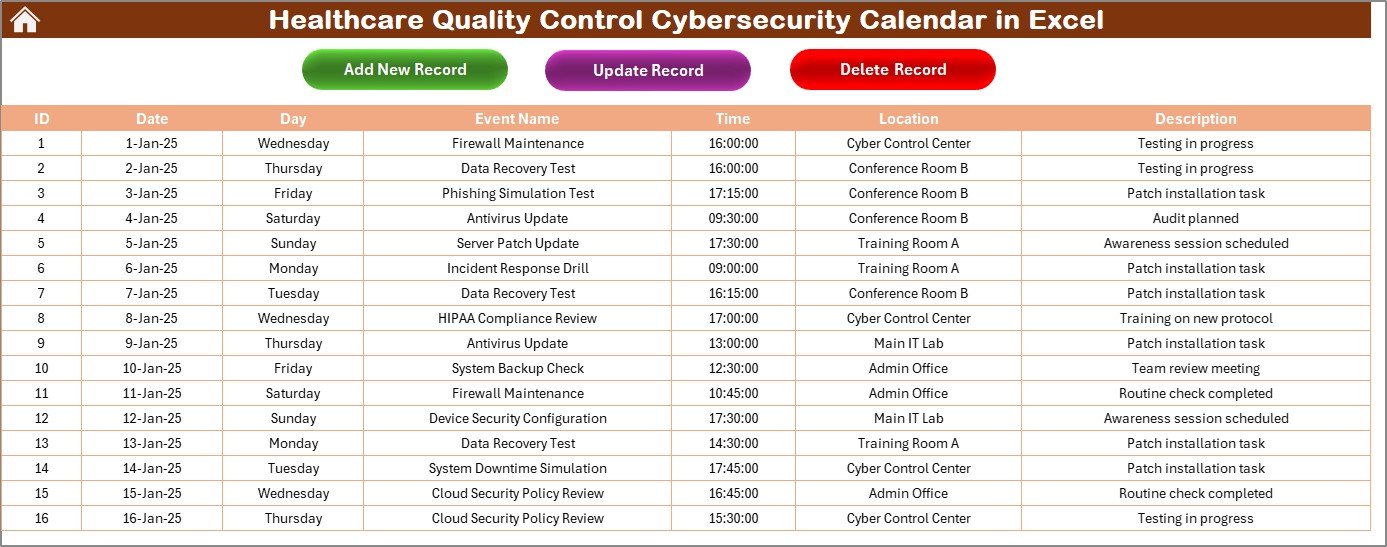
Why Do Healthcare Institutions Need This Calendar?
The healthcare industry handles sensitive patient data daily.
With rising cyber threats, hospitals must not only maintain medical quality but also ensure digital safety.
This Excel calendar offers dual benefits — it strengthens cybersecurity management and quality assurance tracking in one integrated tool.
Let’s explore the main reasons why this calendar is indispensable for healthcare organizations.
1. Cybersecurity Event Management
Track and plan system updates, antivirus scans, data protection workshops, and incident simulations. Keeping a record of cybersecurity actions ensures better defense against breaches.
2. Compliance and Audit Scheduling
Healthcare facilities often face regular compliance audits (HIPAA, ISO, NABH, etc.). The calendar ensures you never miss key inspection or certification dates.
3. Quality Control Monitoring
Schedule internal quality checks, safety inspections, and process validation events systematically to enhance patient care standards.
4. Staff Training and Awareness
Use the calendar to organize cybersecurity awareness programs and employee quality training sessions. It ensures consistent knowledge updates across departments.
5. Data-Driven Decision Making
With all records stored digitally, it’s easier to review trends, analyze event frequency, and measure the effectiveness of your quality or security strategies.
Advantages of Healthcare Quality Control Cybersecurity Calendar in Excel
This Excel calendar offers a range of practical benefits. Let’s look at the most significant ones:
- Centralized Management: Keep all cybersecurity and quality events in one file.
- Automation: Dynamic updating through dropdowns and buttons.
- Customization: Change year, theme, or highlights with ease.
- User-Friendly Interface: Simple layout with intuitive navigation buttons.
- Instant Visibility: Annual, monthly, and daily views make it easy to plan and monitor.
- Data Security: Excel-based file avoids dependency on external servers.
- Printable & Shareable: Export or print any view for team discussions.
- Scalable Design: Works for small clinics or large hospital networks alike.
By combining visibility with functionality, this calendar empowers healthcare teams to maintain compliance and operational excellence.
How to Use the Calendar Step-by-Step
Here’s how you can start using this template effectively:
- Open the Home Sheet.
Choose whether to view Annual, Monthly, or Daily events. - Set Your Year and Month.
Adjust the start month and week format in the control panel. - Add Events.
Use the “Add New Event” button to input data like audits, training, or reviews. - Highlight Key Dates.
Use highlight options to mark weekends, holidays, or cybersecurity awareness days. - Review and Update.
Visit the Events sheet to edit or delete old events. - Analyze Data.
Use Excel filters or pivot tables to evaluate activity frequency or trends.
Following this workflow ensures your calendar stays accurate and insightful throughout the year.
How It Enhances Healthcare Cybersecurity and Quality
This Excel template merges operational control with security awareness — two pillars of modern healthcare management.
- It encourages routine checks, ensuring software updates and data backups are never skipped.
- It supports cross-department collaboration, allowing IT and quality teams to work from the same schedule.
- It promotes accountability, as every event is recorded with timestamps and details.
By maintaining structured visibility, healthcare organizations can reduce system vulnerabilities and enhance patient safety simultaneously.
Best Practices for Using the Healthcare Cybersecurity Calendar
To get the best results, follow these practical tips:
1. Regular Updates
Update the Events sheet weekly to ensure the latest cybersecurity and quality tasks are recorded.
2. Use Clear Naming Conventions
When adding event names, use clear titles like “Firewall Audit” or “Patient Data Backup Review” for easy identification.
3. Highlight Critical Dates
Use the highlight feature to mark important deadlines such as audit submission dates or compliance renewals.
4. Backup Your File
Keep a copy of the Excel file on a secure drive to avoid data loss.
5. Use Filters for Quick Analysis
Apply Excel filters or pivot tables to track event categories, staff responsibilities, or completion frequency.
6. Train Staff on Usage
Ensure that team members know how to add, update, or delete events responsibly.
By following these best practices, your calendar will serve as a reliable tool for both operational and cybersecurity management.
Integration with Other Tools
You can integrate this Excel calendar with:
- Microsoft Outlook: Sync events for automatic reminders.
- SharePoint or Teams: Share the file organization-wide.
- Power BI: Visualize event frequency or risk metrics through interactive dashboards.
These integrations extend the template’s power beyond Excel, creating a unified workflow ecosystem.
Conclusion
The Healthcare Quality Control Cybersecurity Calendar in Excel is more than just a scheduling tool — it’s a complete operational intelligence system. It brings structure, visibility, and accountability to healthcare institutions that must juggle both data security and quality control obligations.
By using this calendar, your organization can manage events proactively, reduce cyber risks, and ensure every compliance task stays on schedule.
In short, this Excel calendar helps you stay organized, secure, and audit-ready throughout the year.
Frequently Asked Questions (FAQs)
- What is the purpose of the Healthcare Cybersecurity Calendar?
It helps healthcare organizations manage and monitor cybersecurity and quality control events in one Excel file.
- Can I customize the calendar design?
Yes. You can change colors, highlight weekends, or adjust the layout using built-in control panels.
- Does it support multiple years?
Absolutely. You can select any year from the dropdown, and the entire calendar updates automatically.
- Can non-technical staff use it?
Yes. The template is designed for simplicity, with intuitive buttons and clear instructions.
- How do I add new events?
Select a date and click “Add New Event.” Fill the form and submit — the event will appear automatically.
- Can I track multiple events on one day?
Yes. The monthly view indicates “More than 1…” if several events fall on the same date.
- Is this template suitable for large hospitals?
Definitely. It scales easily and works for both small clinics and large healthcare networks.
- Can it be linked with Power BI?
Yes. You can connect the event database sheet to Power BI for advanced visual analytics.
- How often should I update the calendar?
Ideally, update it weekly or after every new event to maintain accurate records.
- Where can I download this template?
You can download the Healthcare Quality Control Cybersecurity Calendar in Excel from NextGenTemplates.com.
Visit our YouTube channel to learn step-by-step video tutorials
Watch the step-by-step video tutorial:
Click to buy Healthcare Quality Control Cybersecurity Calendar in Excel
